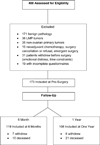Sleep disturbance, distress, and quality of life in ovarian cancer patients during the first year after diagnosis
- PMID: 23797955
- PMCID: PMC3775963
- DOI: 10.1002/cncr.28188
Sleep disturbance, distress, and quality of life in ovarian cancer patients during the first year after diagnosis
Abstract
Background: Sleep disturbance is a common clinical complaint of oncology patients and contributes to substantial morbidity. However, because most sleep studies have been cross-sectional, associations between sleep quality and distress in patients with ovarian cancer over time remain unclear. This prospective longitudinal study examined rates of sleep disturbance; contributions of depression, anxiety, and medication use in sleep disturbance; and associations between sleep quality and quality of life (QOL) during the first year after diagnosis among women with ovarian cancer.
Methods: Women with a pelvic mass completed measures of sleep quality, depression, anxiety, and QOL before surgery. Those diagnosed with primary epithelial ovarian, fallopian tube, or peritoneal cancer repeated surveys at 6 months and 1 year after diagnosis. Mixed modeling was used to examine trajectories of psychosocial measures over time, as well as associations between changes in distress and sleep quality. Relationships between changes in sleep and QOL were also examined.
Results: The majority of patients reported disturbed global sleep (Pittsburgh Sleep Quality Index > 5) at all 3 time points. Medications for sleep and pain were associated with worse sleep at all time points. Greater increases in depression were associated with increased disturbances in sleep quality over time (P < .04). Worsening sleep was also associated with declines in QOL over time (P < .001).
Conclusions: Sleep disturbance is common and persistent in women with ovarian cancer, and is linked to depressive symptoms and QOL. Pharmacologic treatment does not appear to adequately address this problem. Results highlight the need for ongoing screening and intervention for sleep disturbance in this population.
Keywords: anxiety; depression; insomnia; ovarian cancer; quality of life.
Copyright © 2013 American Cancer Society.
Figures
References
-
- Anderson KO, Getto CJ, Mendoza TR, et al. Fatigue and sleep disturbance in patients with cancer, patients with clinical depression, and community-dwelling adults. J Pain Symptom Manage. 2003;25:307–318. - PubMed
-
- Parker KP, Bliwise DL, Ribeiro M, et al. Sleep/wake patterns of individuals with advanced cancer measured by ambulatory polysomnography. J Clin Oncol. 2008;26:2464–2472. - PubMed
-
- Sela RA, Watanabe S, Nekolaichuk CL. Sleep disturbances in palliative cancer patients attending a pain and symptom control clinic. Palliat Support Care. 2005;3:23–31. 2005. - PubMed
-
- Owen DC, Parker KP, McGuire DB. Comparison of subjective sleep quality in patients with cancer and healthy subjects. Oncol Nurs Forum. 1999;26:1649–1651. - PubMed
-
- Kuo H, Chiu M, Liao W, Hwang SL. Quality of sleep and related factors during chemotherapy in patients with stage I/II breast cancer. J Formos Med Assoc. 2009;105:64–69. - PubMed
Publication types
MeSH terms
Substances
Grants and funding
LinkOut - more resources
Full Text Sources
Other Literature Sources
Medical



